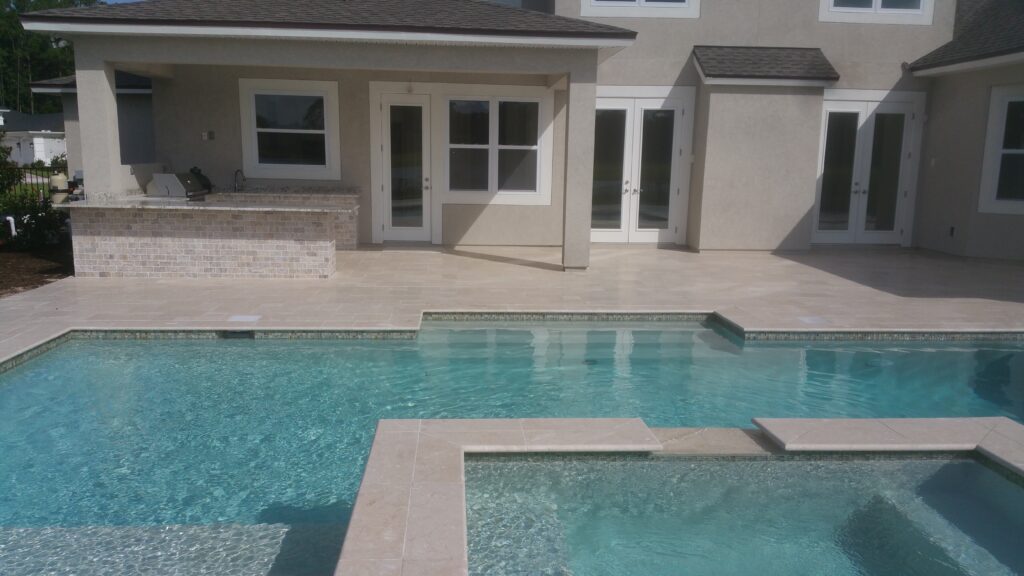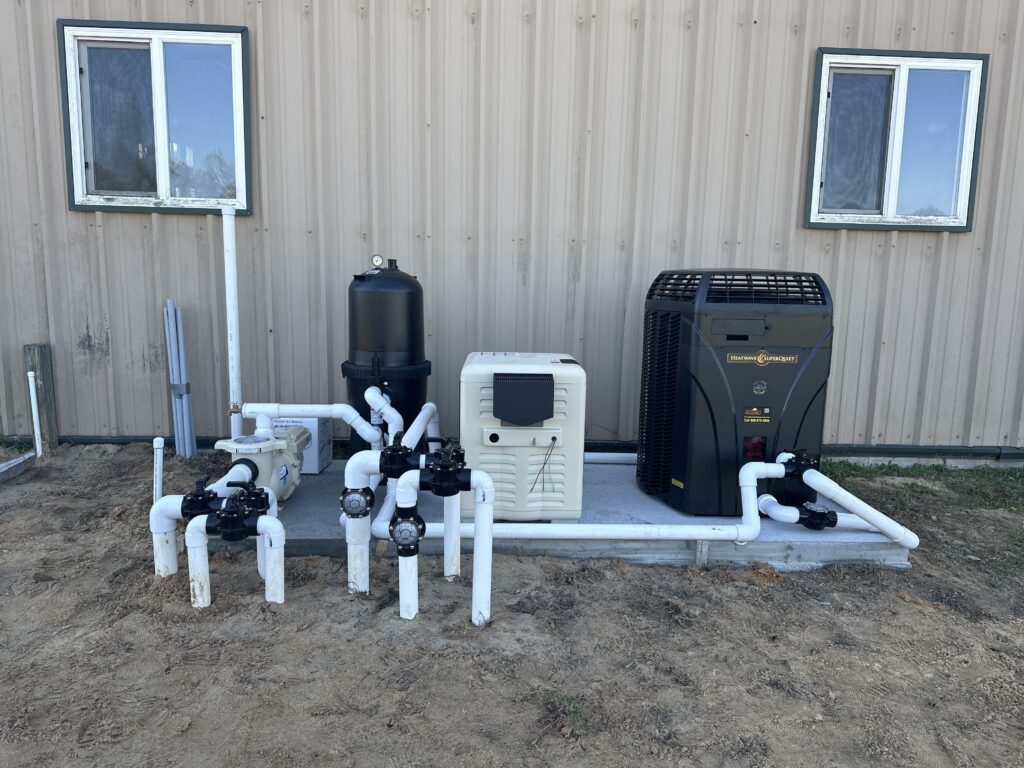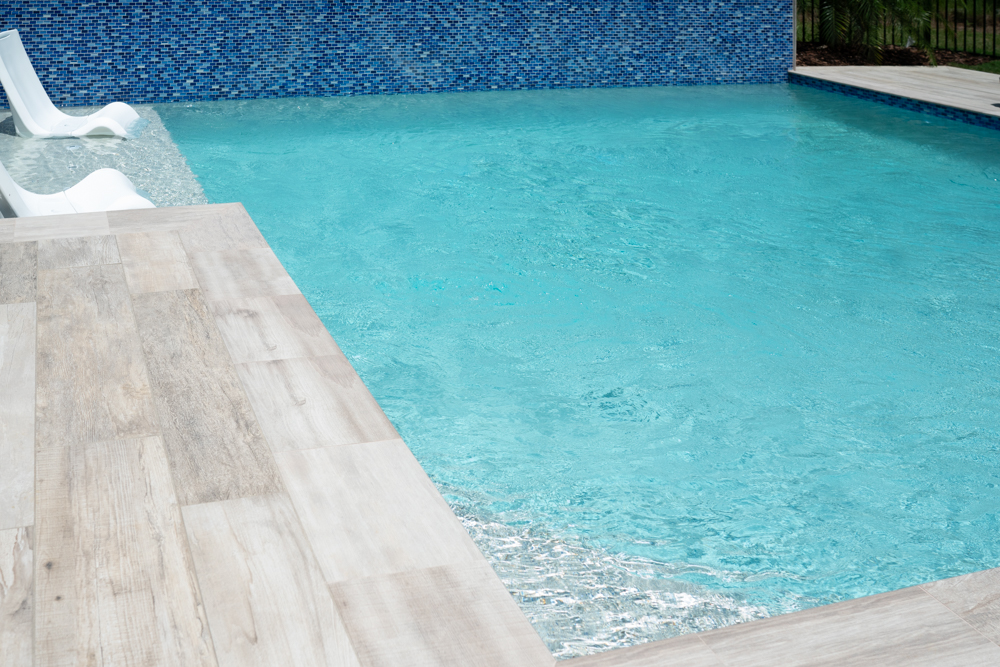
Building a backyard pool is the ultimate way to add luxury, relaxation, and value to your home. But more homeowners are now interested in pools that offer a smaller environmental footprint. Eco-friendly pool designs and sustainable pool technologies have advanced, allowing you to enjoy a beautiful pool while conserving energy and water, using fewer chemicals, and reducing environmental impact. Here’s a look at various options for creating a sustainable, eco-friendly backyard oasis.
1. Energy-Efficient Pool Equipment
Energy-efficient pool pumps, heaters, and filters can significantly reduce the energy needed to maintain a pool.
Energy-Efficient Pool Pumps
Modern pool pumps are designed to use less energy by operating at variable speeds. Instead of running at maximum capacity all the time, these pumps adjust speed based on need, which can cut energy usage by up to 90% (source).
- Variable-speed pumps: Unlike traditional single-speed pumps, variable-speed pumps run at different speeds throughout the day, using less energy during off-peak hours. At Southern Outdoor Spaces we use Pentair’s Intelliflo VSF Pump.
- Energy Star-certified pumps: Pumps with the Energy Star certification are proven to be more efficient and have met rigorous energy-efficiency guidelines set by the EPA.
Eco-Friendly Pool Heaters
Opting for a solar-powered pool heater is one of the best ways to heat your pool sustainably. Solar pool heaters use the sun’s energy, making them highly energy-efficient and, after installation, cost-free to operate. If you live in a cooler climate or want a backup for cloudy days, consider a high-efficiency heat pump (source), which extracts heat from the air to warm your pool while consuming less energy.
2. Solar Pool Covers and Pool Enclosures
Solar pool covers are essential for conserving heat and reducing evaporation. These covers can keep the pool water warm, even on cooler days, without additional heating. By reducing evaporation, they also help save on water and reduce the need for chemical treatments.
- Solar pool covers: Solar pool covers are designed to trap the sun’s heat and transfer it to the water below, keeping the pool warm without extra energy costs.
- Automatic pool covers: Automatic covers are convenient, reducing water and energy loss while keeping debris out, which minimizes the need for frequent cleaning and chemical use.
For year-round protection, consider a pool enclosure. Pool enclosures create a mini-greenhouse effect that retains heat and keeps the pool clean, requiring fewer chemicals and less water top-up.
3. Natural Pools: A Chemical-Free Solution
If you’re looking for a truly eco-friendly approach, natural pools, or “swimming ponds,” are an innovative choice that uses natural filtration systems instead of chemicals. With plants, gravel, and specially designed filtration zones, these pools create a balanced ecosystem that cleans the water naturally (source).
How Natural Pools Work
Natural pools are divided into two zones:
- Swimming Zone: This area resembles a traditional swimming pool and is designed for swimming.
- Regeneration Zone: Planted with aquatic plants and gravel, this area acts as a natural filter, cleaning the water as it flows from the swimming zone to the regeneration zone and back.
Since natural pools are chemical-free, they’re gentle on the skin and don’t produce chlorine by-products that can cause eye and respiratory irritation. Plus, their design is highly customizable to fit into different backyard styles.
4. Eco-Friendly Pool Materials
Selecting sustainable materials can help you make a smaller environmental impact, right from the construction stage.
Recycled and Sustainable Materials
Look for recycled and sustainable options, such as:
- Recycled glass: This can be used for pool tiling and even in filtration systems as an alternative to traditional sand filters.
- Bamboo decking: Bamboo is a renewable resource that grows quickly and is highly durable, making it an eco-friendly alternative to hardwood for pool decks.
- Natural stone: Locally sourced stone is a sustainable choice and offers a natural look that blends well with eco-friendly designs.
Low-VOC Finishes
Some pool finishes and coatings can release volatile organic compounds (VOCs) into the environment. Opt for low-VOC or VOC-free finishes to keep the air and water clean (source).
5. Efficient Pool Filtration Systems
Traditional sand filters use a lot of water and energy to backwash and clean the system. Alternatives like cartridge filters and glass media filters require less water and energy.
- Cartridge filters: These filters are highly efficient and don’t require backwashing, saving water and energy.
- Glass media filters: Glass filtration media is made from recycled glass and provides excellent water clarity while requiring less frequent cleaning.
An efficient pool filtration system minimizes water waste and reduces the amount of energy required to keep the pool clean, making it a smart investment for an eco-friendly pool.

6. LED Pool Lighting for Energy Efficiency
LED lighting is far more energy-efficient than traditional incandescent pool lights. LEDs use up to 85% less energy and have a longer lifespan, reducing both your electricity bill and the frequency of bulb replacements (source).
For an added touch of sustainability, consider solar-powered LED lights for your pool area. These lights absorb sunlight during the day and provide illumination at night, perfect for creating ambiance without increasing energy consumption.
7. Rainwater Harvesting for Pool Refill
Incorporating a rainwater harvesting system allows you to refill your pool with rainwater, reducing dependency on municipal water. Rainwater systems can capture and filter rain from your roof and direct it to the pool or storage tank for later use (source).
By reducing your reliance on tap water, rainwater harvesting is a sustainable way to keep your pool filled while conserving a valuable resource.
8. Sustainable Pool Landscaping
Landscaping around your pool can impact its eco-friendliness. By incorporating native plants and drought-tolerant landscaping, you can create a natural setting that requires less water and reduces the need for chemical treatments.
Native and Drought-Tolerant Plants
Native plants are already adapted to the local climate and require minimal watering and maintenance. They also attract local wildlife, creating a harmonious backyard environment.
- Xeriscaping: This is a landscaping technique that uses drought-resistant plants, conserving water and reducing maintenance.
- Natural shade structures: Trees and plants around the pool can provide natural shade, which helps regulate pool water temperature and reduces evaporation.
Permeable Pavers and Decking
Permeable pavers allow water to seep through, reducing runoff and improving the absorption of rainwater into the ground. This eco-friendly choice also helps with drainage and minimizes water waste.

Choosing sustainable options for your backyard pool can reduce environmental impact, lower energy and maintenance costs, and provide a beautiful, relaxing space. From energy-efficient equipment to natural pool alternatives, every eco-friendly choice contributes to a greener backyard that you and your family can enjoy with peace of mind.
If you’re considering a custom pool and want to incorporate sustainable options, reach out for a consultation to discuss how we can build a luxurious, eco-friendly oasis in your own backyard. Embrace eco-friendly pool options and enjoy all the benefits of a beautiful, sustainable backyard retreat.
By adopting these eco-friendly pool technologies, you’re not only saving money and energy but also contributing to a more sustainable future. Whether you’re interested in energy-efficient equipment, rainwater harvesting, or building a natural pool, there are numerous ways to make your backyard pool an eco-friendly sanctuary.